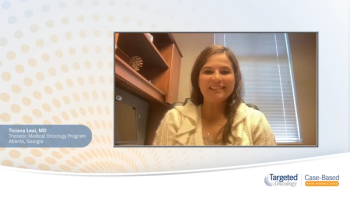
Ticiana Leal, MD, discusses how recently approved targeted therapies for small cell lung cancer (SCLC) significantly enhance survival outcomes and reshape treatment strategies for both limited and extensive stages of the disease.

Your AI-Trained Oncology Knowledge Connection!


Ticiana Leal, MD, discusses how recently approved targeted therapies for small cell lung cancer (SCLC) significantly enhance survival outcomes and reshape treatment strategies for both limited and extensive stages of the disease.

Ticiana Leal, MD, discusses how in cases of extensive stage small cell lung cancer (ES-SCLC) that progress within 6 months of platinum-based chemotherapy, treatment options such as tarlatamab, lurbinectedin, topotecan, and irinotecan should be considered, alongside the potential to extend chemoimmunotherapy cycles. She also addresses the impact of National Comprehensive Cancer Network (NCCN) guidelines and the consideration of prophylactic cranial irradiation (PCI) despite negative brain imaging results.

Ticiana Leal, MD, discusses how tarlatamab, a bispecific T-cell engager (BiTE), leverages the aberrant expression of delta-like ligand 3 on small cell lung cancer (SCLC) cells to direct T-cell-mediated tumor lysis, its promising efficacy shown in the phase 2 DeLLphi-301 study, and the potential clinical benefits of combining it with durvalumab for maintenance therapy after platinum-based chemotherapy.

Ticiana Leal, MD, discusses how ifinatamab deruxtecan, a B7-H3 antibody-drug conjugate, targets the overexpressed B7-H3 in extensive-stage small cell lung cancer (ES-SCLC) to potentially enhance immune response and improve clinical outcomes, as highlighted by efficacy results from the Phase 1/ 2 IDeate-Lung02 study, which reported a 52.4% objective response rate and a 12.2-month overall survival (OS).

Ticiana Leal, MD, discusses how lurbinectedin, a synthetic alkaloid derived from marine sources, exerts its antitumor effects by binding to DNA and disrupting repair mechanisms, highlighting promising efficacy results in the Phase 2 PMO1183 trial, where it achieved a 45% objective response rate (ORR) and an 11.2-month median overall survival in patients with relapsed small cell lung cancer (SCLC).

Ticiana Leal, MD, discusses how emerging targeted therapies for extensive-stage small cell lung cancer (ES-SCLC) are showing promising objective clinical outcomes that may surpass those of second-line treatments such as topotecan and CAV regimens, particularly highlighting the need to evaluate specific compounds based on platinum-sensitive vs platinum-resistant disease profiles and the potential role of TIGIT inhibitors in future treatment lines.